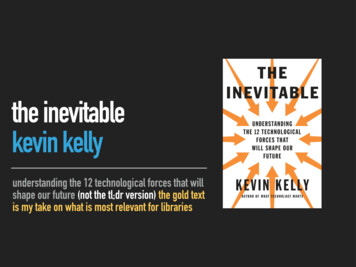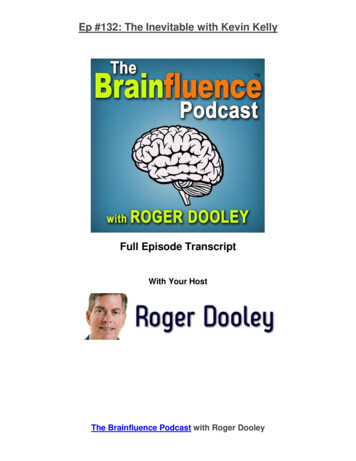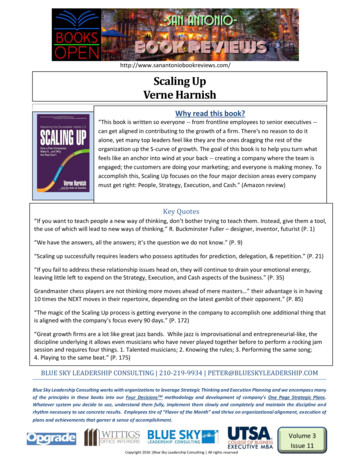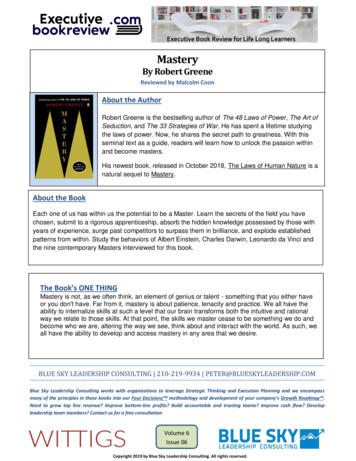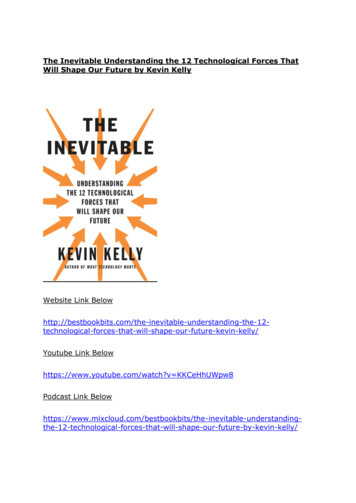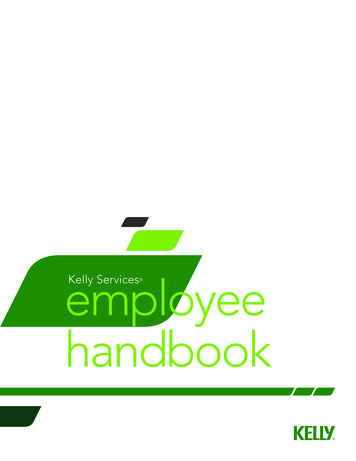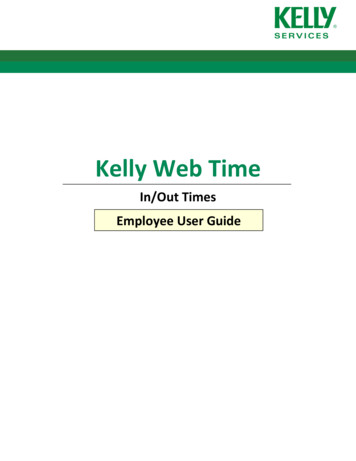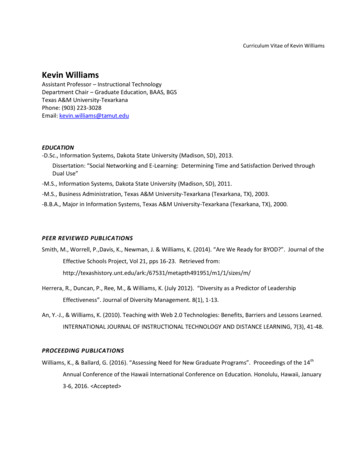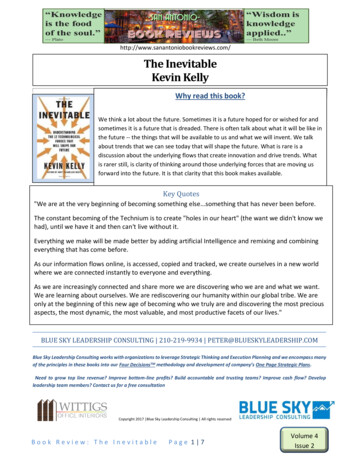
Transcription
http://www.sanantoniobookreviews.com/The InevitableKevin KellyWhy read this book?We think a lot about the future. Sometimes it is a future hoped for or wished for andsometimes it is a future that is dreaded. There is often talk about what it will be like inthe future -- the things that will be available to us and what we will invent. We talkabout trends that we can see today that will shape the future. What is rare is adiscussion about the underlying flows that create innovation and drive trends. Whatis rarer still, is clarity of thinking around those underlying forces that are moving usforward into the future. It is that clarity that this book makes available.Key Quotes"We are at the very beginning of becoming something else.something that has never been before.The constant becoming of the Technium is to create "holes in our heart" (the want we didn't know wehad), until we have it and then can't live without it.Everything we make will be made better by adding artificial Intelligence and remixing and combiningeverything that has come before.As our information flows online, is accessed, copied and tracked, we create ourselves in a new worldwhere we are connected instantly to everyone and everything.As we are increasingly connected and share more we are discovering who we are and what we want.We are learning about ourselves. We are rediscovering our humanity within our global tribe. We areonly at the beginning of this new age of becoming who we truly are and discovering the most preciousaspects, the most dynamic, the most valuable, and most productive facets of our lives."BLUE SKY LEADERSHIP CONSULTING 210-219-9934 PETER@BLUESKYLEADERSHIP.COMBlue Sky Leadership Consulting works with organizations to leverage Strategic Thinking and Execution Planning and we encompass manyof the principles in these books into our Four DecisionsTM methodology and development of company’s One Page Strategic Plans.Need to grow top line revenue? Improve bottom-line profits? Build accountable and trusting teams? Improve cash flow? Developleadership team members? Contact us for a free consultationCopyright 2017 Blue Sky Leadership Consulting All rights reservedBook Review: The InevitablePage 1 7Volume 4Issue 2
http://www.sanantoniobookreviews.com/Understanding the 12 Technological Forces that Shape Our Future1. Becoming" All of us - every one of us -will be endless newbies in the future simply trying to keep up."We are in a constant state of becoming1. Most of the important technologies that will dominate life 30 years from now have not yet beeninvented.2. New technology requires endless upgrades3. Because the cycle of obsolescence is accelerating, you will have time to master anything before itis displaced.Protopia - is the state of the future -Not Utopia or Dystopia - Protopia is a process and progress - a becoming.Unceasing change can blind us to its incremental changes. In constant motion, we no longer notice themotion. We are at the beginning. The last 30 years have created a starting point. The things that we make willbe constantly, relentlessly becoming something else.In the early days, what we fail to see was how much of this brave new online world would be manufactured byusers, not big institutions - the user creators.2. Cognifying"It is hard to imagine anything that would change everything as much as cheap, powerful, ubiquitous artificialintelligence."1. AI should not just be cheap, but free. And the first genuine AI will not be birthed in a standalonesupercomputer but in the super organism of a billion computer chips.2. The arrival of artificial thinking accelerates all other disruptions.3. Artificial thinking of the future will not be the HAL 9000 of science fiction but rather more likeAmazon web services-cheap, reliable, industrial grade digital smartness running behind everythingand almost invisible except when it blinks off.4. There's almost no industry that cannot be cognified -music, investments, marketing, laundry, realestate, nursing, construction, affects, toys, sports, maybe even knitting - everything we make, willbe made better by adding intelligence.Recent Breakthroughs make long awaited AI Possible:1. Cheap Parallel Computation, 2. Big Data, 3. Better AlgorithmsRobots can take human and non-human form. They don't think better, they think different.1. Jobs humans can do but robots can do even better - drive cars, fly airplanes, x-ray and MRIAnalysis, manufacturing2. Jobs humans can't do that robots can - quickly search all web pages, mm CAT scan analysis, realtime calculations3. Jobs we didn't know we wanted done - answer questions (google), control house when away4. Jobs only humans can do - at first - personal work botsBook Review: The InevitablePage 2 7Volume 4Issue 2
http://www.sanantoniobookreviews.com/3. Flowing"Our civilization's previous economy was built on warehouses of fixed goods and factories stockpiled withsolid cargo."The digital economy runs on a river of freely flowing copies. -- Email, Twitter Streams, Facebook Wall,Streaming Movies, YouTube Videos -- We are bathed in streams of notifications and updates. We tag, likeand, favorite. Data does not remain still. Data is liquefied. Fixed and solid things become services andeverything flows into the stream of now, in real time - to and from the cloud.Products become services - generative value is a quality or attribute that must be generated at the time of thetransaction - it is temporal. A generative cannot be faked or replicated. It cannot be copied, cloned, stored orwarehouse. Generative qualities add value to free copies:Eight Generatives that are "better than free":1.2.3.4.5.6.7.8.Immediacy - getting something sooner is better than getting a laterPersonalization - a drug tailored to your DNAInterpretation - software free. User Manual 10,000Authenticity- peace of mind of running bug free software - digital watermarks.Accessibility - conveniently accessible music, why ownEmbodiment - leather bound book vs. a PDF copy, the TED ExperiencePatronage - fans want to pay creatorsDiscoverability - no value in the unseen4. Screening"In ancient times culture revolved around the spoken word. Today more than five billion digital screensilluminate our lives."The Power of the Book replaced the oral traditions of storytelling. We wrote everything down. We createdlaws that were made real in book. The power of the book has been replaced by the Power of the Screen.The Universal Library: to have in one place all knowledge, past and present. All books, all documents, allconceptual works, in all languages - all connected. carried in your pocket, or accessed in the cloud,anywhere."Screens provoke action instead of persuasion. propaganda is less effective in a world of screens, becausewhile misinformation travels as fast as electrons, corrections to too."Screens not only tell us about the online world, they can tell us what is going on in the physical world - SocialNetworks, Augmented Reality and Sensors.5. Accessing"Uber, the world's largest taxi company, owns no vehicles. Facebook, the world's most popular media owner,creates no content. Alibaba, the most valuable retailer, has no inventory. And AirBnB, the world's largestaccommodation provider, owns no real estate."Possession is not as important as it once was. Accessing is more important than ever.Book Review: The InevitablePage 3 7Volume 4Issue 2
http://www.sanantoniobookreviews.com/There are five deep technological trends that accelerate this long-term move toward accessing and away fromownership:1.2.3.4.Dematerialization - making better stuff using fewer materials (beer cans, cars, computer monitors)Real time on demand - Uber for X - our appetite for the instant is insatiable.Decentralization - cheap ubiquitous communication, money, bitcoinPlatform Synergy - Amazon Web Services, Facebook, Apple, Microsoft, Google, WordPress platforms are factories for services; services favor access over ownership.5. Clouds - millions of computers braided together to act as a single large computer - invisible andthey run our digital lives - dynamically distributed - Where my stuff is - where do I stop and wheredoes the cloud start?6. Sharing"We live in a golden age now. The volume of creative work in the next decade will dwarf the volume of thelast 50 years. More artists, authors and musicians are working than ever before, and they're creatingsignificantly more books, songs, films, documentaries, photographs, artwork, operas, and albums every year.every kind of creative content that can be digitally copied.""The largest, fastest growing, most profitable companies and 2050 will be companies that will have figured outhow to harness aspects of sharing that are invisible and unappreciated today. Anything that can be shared -thoughts, emotions, money, health, time -- will be shared in the right conditions, with the right benefits.Anything that can be shared can be shared better, faster, easier, longer, and in a million more ways than wecurrently realize. At this point in our history, sharing something that has not been shared before, or in a newway, is the surest way to increase its value."Digital Socialism is not class warfare, it is not anti-American. Digital Socialism is American innovation.Harnessing the power sharing of the crowd.Increasing degrees or levels of sharing:1. Sharing - the online public as an incredible willingness to share - Facebook, Flickr, Instagram.2. Cooperation - individuals working together toward a large-scale goal produces results thatemerged at the group level - Wiki, Twitter, Reddit.3. Collaboration - organize collaboration can produce results beyond the achievement of ad hoccooperation - Free Apache Servers, Arduinos, Raspberry Pi4. Collectivism - social production and tear production can enhance creativity, a productivity andfreedom - Wikipedia, Facebook Groups, Patients Like Me, Kiva, Netflix Context, X prize)7. Filtering"There has never been a better time to be a reader, a watcher, a listener, or a participant in humanexpression. An exhilarating avalanche of new stuff is created every year. Every 12 months we produce eightmillion new songs, two million new books, 16,000 new films, 30 billion block posts, 182 billion tweaks, 400,000new products. The result is an infinite hall of options."How do we filter: gatekeepers, intermediates, curators, brands, government, cultural environments, friends,ourselves?Book Review: The InevitablePage 4 7Volume 4Issue 2
http://www.sanantoniobookreviews.com/The problem: even after filtering we still have too many choices. So, we narrow even further: more of what Ilike, what my friends like, stuff I don't like but would like to like.Google and Facebook filters are automatic, we don't choose those.The question is: How will we choose to spend our attention?8. Remixing"All new technologies derive from a combination of existing technologies. (this recombining) creates anunlimited number of possible new technologies. any literate person can cut and paste IDs, annotate themwith her own thoughts, link them to related IDs, searched through vast libraries of work, browse subjectsquickly, resequence texts, refind material, remakes ideas, quote experts, and sample bits of beloved artist.These tools, more than just reading, are the foundations of literacy."Photos, videos, music, text - easy access, easy to copy, cheap, easy to use tools of creation.We can share it. We can fact check. We can re-make it. We can rewind it. We can compare it. It ALL lives inthe cloud forever accessible. We can combine with AI and use AI to find what was previously not available.9. Interacting"We are equipping our devices with sensors - eyes, ears, motion - so that we can interact with them. They willnot only know we are there, they will know who is there and whether that person is in a good mood."Future office workers will be not be pecking at a keyboard but talking to a device and communicating withhand gestures.The dumbest objects we can imagine today can be vastly improved by outfitting them with sensors andmaking them interactive - Nest Thermostats.Wearables will not be just glasses and smart watches, but clothes that help the blind see and the deaf hear.Clothes, by the way that can also tell the washing machine how dirty they are and how to clean them.In the coming decades, we will keep expanding what we interact with following these three thrusts:1. More sensors - we will keep adding new sensors and senses to the things we make. (GPS, heatdetection, x-ray vision)2. More intimacy - technology will get closer to us than a watch or a pocket phone. It will be oneverywhere (your BIO ID is your new password)3. More immersion - virtual reality and augmented reality will allow computation so close we areinside it - find yourself standing within a technologically created world.10. Tracking"Digital magic has shrunk devices such as thermometers, heart rate monitors, motion trackers, brainwavedetectors and hundreds of other complex medical appliances to the size of words on the page. Thesemacroscopic measurers can be inserted into watches, clothes, spectacles or phones or inexpensively disbursedin our rooms, cars, offices and public spaces."There is literally nothing that will not be tracked.Book Review: The InevitablePage 5 7Volume 4Issue 2
http://www.sanantoniobookreviews.com/We tend to be uncomfortable being tracked today because we don't know much about who is watching us.(Asymmetrical surveillance) The balance between surveillance and privacy is found in restoring symmetry holding the surveyors to account.The Big Surprise - humans need to share is greater than our need for privacy. The best systems work wherethere is free, open sharing with a small amount of anonymity. (protect whistle blowers, EBay pseudo-privateuser names).To exploit the full potential of the zillions of bits of data that we are harvesting and creating, we need to beable to arrange the bits in ways that ma
The Inevitable Kevin Kelly Why read this book? We think a lot about the future. Sometimes it is a future hoped for or wished for and sometimes it is a future that is dreaded. There is often talk about what it will be like in the future -- the things that will be available to us and what we will invent. We talk about trends that we can see today that will shape the future. What is rare is a .
